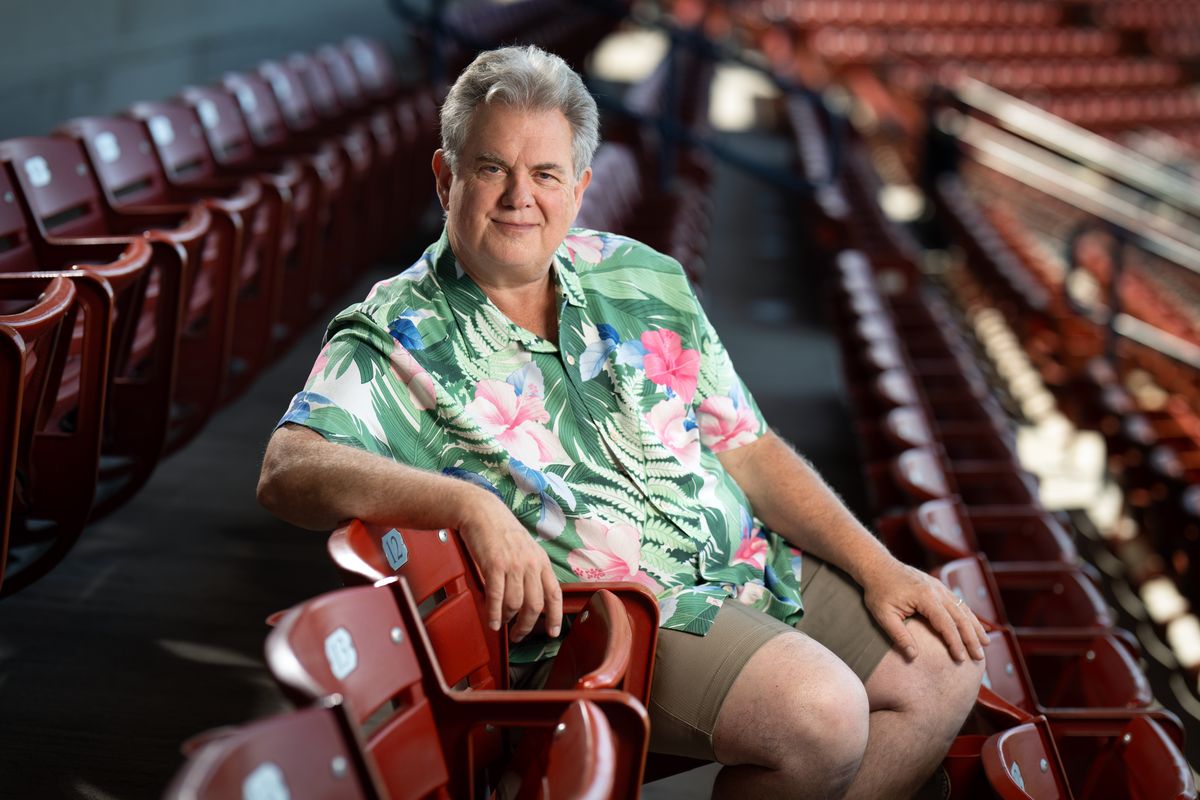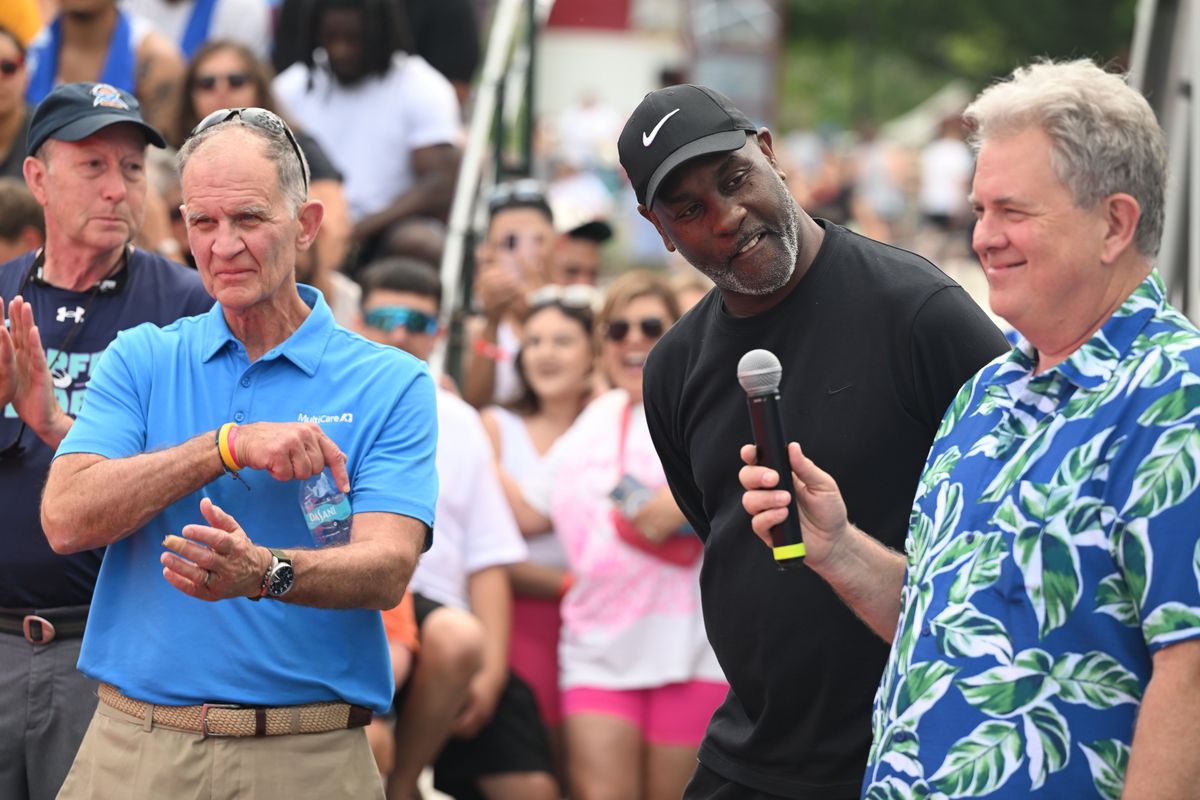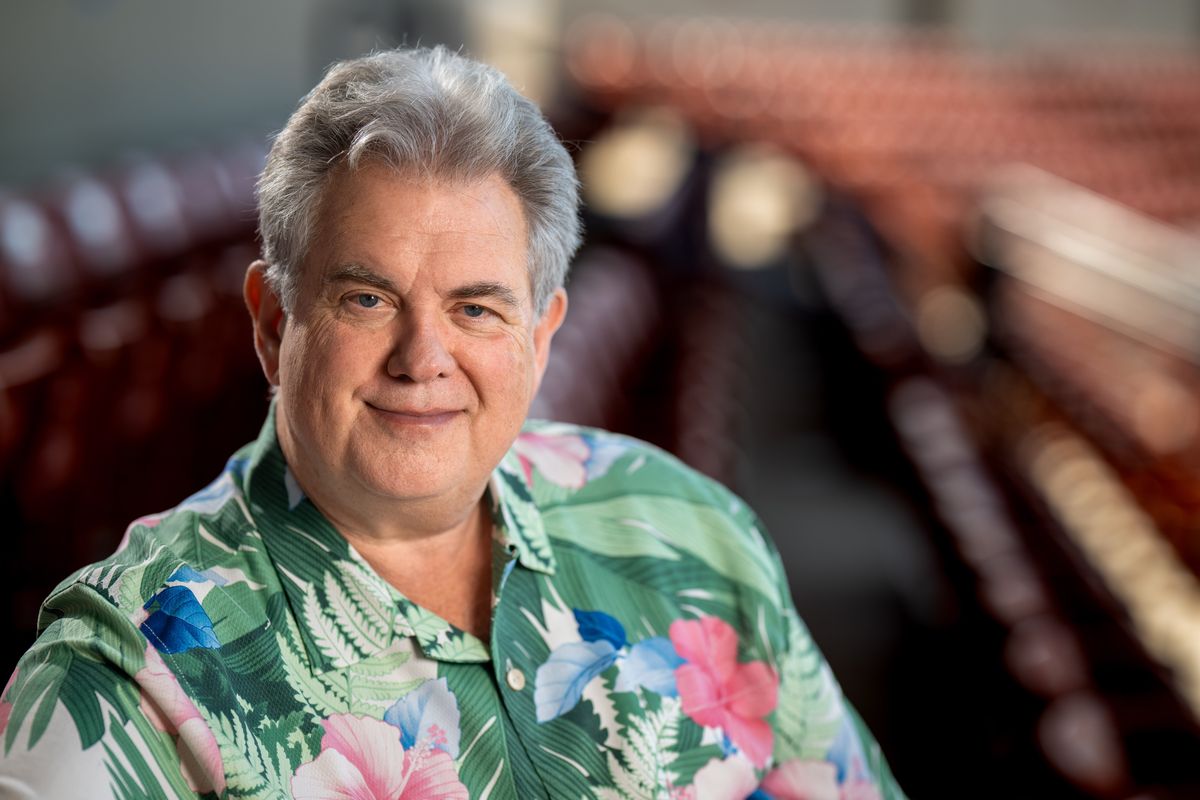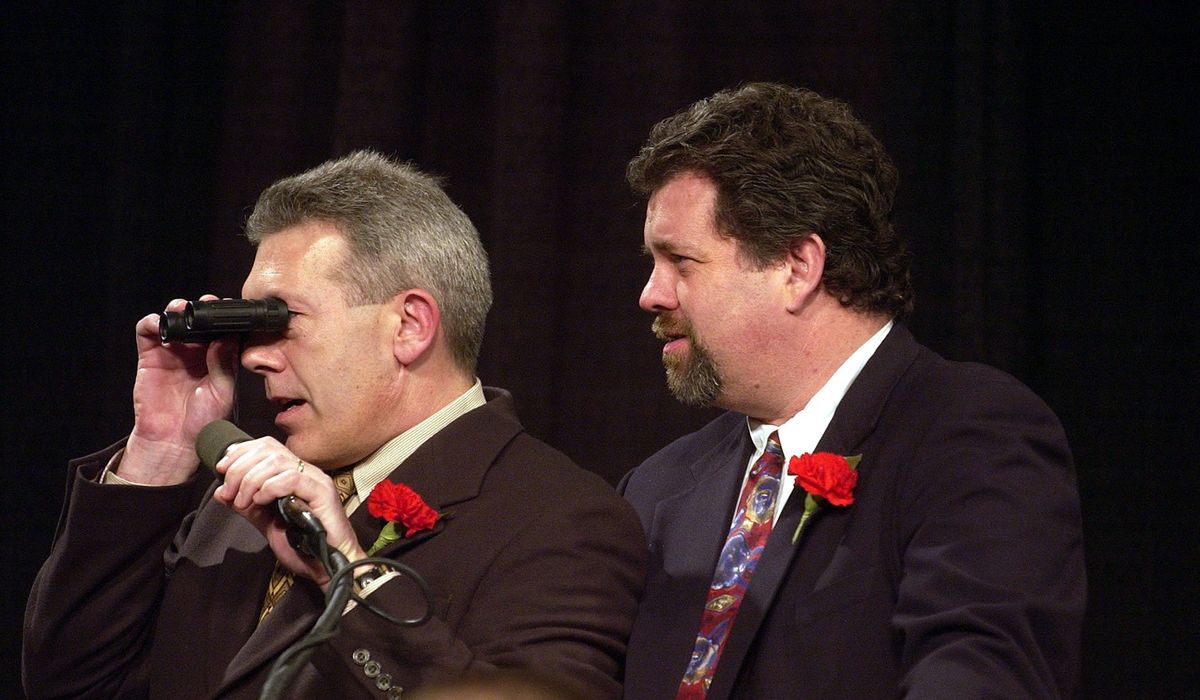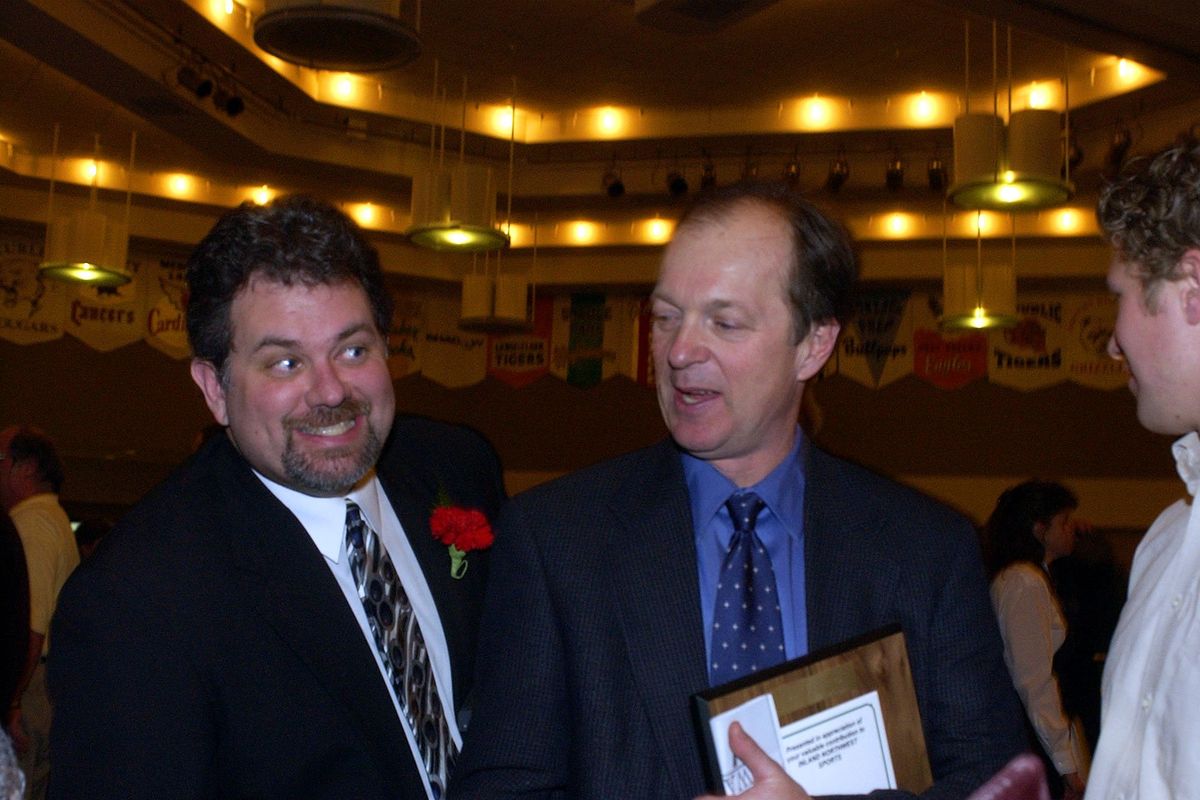The king of local TV sports, Dennis Patchin bids farewell with his trademark Hawaiian shirt, a still-spicy attitude and an incredible legacy
After some 40 years covering local sports for Spokane television and radio, Dennis Patchin signs off on Thursday night. (Colin Mulvany/The Spokesman-Review)
What? Dinner in front of the tube with no place setting for Dennis Patchin?
Chiefs highlights and Zags recaps without his brisk narration? No more of him giving high school touchdowns the Super Bowl treatment and making B tournament 3-pointers sound so improbable you’d think it was Steph Curry bringing home the gold?
The nightly sports without a whisper – not that he ever relied on that volume setting – of Dennis Patchin?
OK, all together now:
Are you kidding me?
In Spokane, we hold some truths to be self-evident. You’ll never be able to dodge every pothole on North Monroe. They’ll never write down your order at Dick’s. Good-hearted donors will always fill the shelves for needy families at the newspaper’s Christmas Bureau.
And Dennis Patchin will be out there, somewhere, to dish you the sports – in 21/2 minute bites on the 6 o’clock news, on SWX Overtime, on a radio talk show or a play-by-play call – with his “are you kidding me” signature.
Except that on Thursday night, DP will do his last report from the anchor desk at KHQ and sign off for good.
That’s 33 years of the nightly news and 40 of a near-daily presence in this broadcast market coming to an end, unheard of durability in a business in which stations have been known to throw a new face, haircut and necktie in front of the camera at the drop of a ratings point.
“You’ll never see this again,” said Keith Osso, a former Patchin protégé who put in 18 years doing sports at KXLY. “I couldn’t do it, and I’m from here and was treated well and had no aspirations to move on. The business just doesn’t lend itself to doing it as long – and as well – as Dennis has.”
Four decades – long enough to be doing stories about the kids of kids of kids he covered when he first arrived at KXLY in 1984. Long enough to see television approaches that station consultants once ripped apart – if only to justify their paychecks – come back into vogue. Long enough to be done with it all, which he is – but not exactly.
“I’m 66 and I’m ready,” Patchin said, “but it’s not like I ever stopped having fun.”
Improbable, for sure, in a business in which fun seems to have a shelf life.
Rick Lukens, left, and Dennis Patchin team up to emcee the annual Sports Award banquet in 2002. (Christopher Anderson/The Spokesman-Review)
• • •
If one calendar year is seven in a dog’s life, what’s the aging rate for a local news sportscaster?
Well, let’s not get carried away. Sports guys can last. Ed Sharman, sort of the job’s godfather in this city, did 20 years at Q-6. Patchin’s former KXLY running buddies – Bud Nameck, Rick Lukens and Osso – all did 14 years or more in TV sports.
But it’s also true that KREM once went through eight sports directors in 15 years, and that a late-1970s hire at KXLY – who read the scores wearing a shirt open to the sternum, a medallion dancing on his chest hair – lasted all of six weeks.
The job can be the most dangerous of intersections, bringing together ambition, Q scores, unforgiving hours, marginal pay, buyer’s remorse, budget cuts and, often as not, the whims of a new news director.
“Guys in this town have been fired because (stations) didn’t like their voice or how they looked sitting next to the news anchors,” Patchin said.
And here are two telltale numbers: During his run, Spokane’s commercial stations have employed 67 other sports anchors and reporters. Only 16 of those are still doing daily television, not counting the current local lineup.
“A lot of times the business ends up being not what they thought it was going to be,” said Lukens, who did 21 years in TV sports, then moved to news and later teamed with his wife, Teresa, for a radio show. “A lot of people get into this thinking, ‘I’m going to be on TV and do fun stories.’ There’s a lot more work, you have to have a lot thicker skin, you have to take crap from news directors and consultants. There’s a lot more iceberg below the water and it’s real cold down there.”
• • •
He felt the chill early.
It all started at a 5,000-watt radio station in … wait, this isn’t the Ted Baxter story. But while in college at Idaho State, Patchin landed a gig in town spinning records at KSNN, 6 to midnight on weekends. Within weeks, it seemed, he added duties as sports director, news director and program director – all before the age of 21.
“And one day they fired every employee in the building except two of us – the other guy was a college buddy I’d hired,” he recalled. “The FM station was 24 hours and in those days you had to have someone in the building even if the station was automated. So I called and said, ‘The good news is you still have a job. But we have to work 12-hour shifts.’ He picked 6 a.m. to 6 p.m. We did that for two weeks until they hired some staff.
“Anybody in the business has a horror story like that.”
It was also in college that he started doing weekend sports at KPVI-TV, and veered away from his original plan of teaching high school history and coaching football. And the most important college development: meeting Dorothy Wootan, the daughter of a potato farmer, who took a withering view of his future son-in-law’s field.
“No person can make a living working five minutes a day,” Marvin Wootan said. “This man you married doesn’t do anything and you’ll never be able to raise a family.”
And he wasn’t even a news director wielding a pink slip.
Nonetheless, Patchin got a job out of college as sports director at KECI in Missoula, and two years later landed at KXLY when Nameck convinced his bosses to expand the sports staff to an unprecedented-for-Spokane three.
“In those days, KXLY news didn’t have a great reputation,” Nameck explained, “and the people in charge, instead of saying, ‘Ugh, sports,’ saw sports as an opportunity to make some inroads. But we knew that with three of us, we were out on a limb. How do you rationalize having three if you don’t produce? So that spurred us on.”
And Patchin found his sweet spot.
“Bud and Rick and I were together for 12 years,” he said, “and I don’t remember anybody getting mad at anyone, ever. We had different strengths, but we made each other better. The fact that we’re all within 363 days of one another had something to do with it.
“But really, we just wanted to win. If somebody was covering something better than us, we had to do more and we thrived on that.”
Never did they win as big as they did with “Friday Night Sports Extra.”
The high school football highlights show, tacked on after the late Friday newscast, was a showpiece of hustle and quickly became a hit – and was eventually imitated at the other stations. Enlisting some help from news photographers and affiliate stations, the KXLY crew assembled clips from as many as 20 games – fanning out to towns within a 100-mile radius. The Davenports and Coltons that never made any broadcast before were suddenly getting airtime like the Gonzaga Preps and Meads – and not just the players but bands, cheerleaders and homecoming courts.
“It was born out of us getting our asses chewed,” Patchin revealed.
Nameck once took some vacation time during a State B tournament. Lukens and Patchin worked the Wednesday opening games, then were summoned for a morning meeting with a news director irate that he hadn’t been given notice about the coverage plans, and demanding to know how they were going to make up for it.
“Rick said we’ll just show highlights of every game,” Patchin said.
Ridiculously, they managed to do just that. Then the brainstorming began over beers, and soon Nameck was crafting a proposal for a football show.
“After we did the first one,” Patchin said, “I told Rick and Bud it was the most fun I’d ever had at work.”
• • •
Perhaps the impression is being given that Dennis Patchin is this island of tranquility in the roiling waters of local sports TV, and that might be the first time his name has been paired with a descriptive like “tranquility.”
So, no, like a lot of young broadcasters, Patchin was ambitious, though it was something less than happy feet. At one point, he applied for and was offered a job at KGW in Portland, then turned it down for how the iffy dynamics might affect his family.
Later, he would pursue the radio play-by-play job with the Seattle SuperSonics when the club ended TV and radio simulcasting. They hired David Locke instead – and fired him a year later.
There were hiccups here, too.
Patchin essentially was fired twice at KXLY – first in 2009, after seven years as sports director, when he was moved to radio full time in a personnel shakeup. He was back on the nightly newscasts by 2013 but only for about a year, going back to radio but appearing in “Are You Kidding Me?” opinion segments.
But the unkindest cut came in 2001, after four years of doing play-by-play of Gonzaga basketball on KXLY Radio. That gig had taken Patchin to an NCAA Elite Eight and two Sweet 16s, a seat on the wing of a rocket that was the best story orbiting college basketball nationally.
Then the station lost the broadcast rights.
“I was pissed off,” he admitted. “That’s probably been the thing that hurt me the most. It was great for the station and a great thing for me and I did it well, and then the station screwed it up, and I was upset with how it was handled.”
But the ultimate whack didn’t come until 2020, when he was laid off and the radio show that had run off and on for 30 years in various incarnations – the last few years with Lukens – canceled. Six weeks later, John Fritz – a former sports director himself – called to offer him the job at KHQ/SWX, a seemingly odd move given Patchin’s long identification with KXLY.
“Really, it was about who’s the best person to lead the department,” Fritz said. “I didn’t put a label on where he’d worked in the past. He’s passionate about covering sports and he’s tireless. He just cares so much about how it’s done and he’s generous with how he’s mentored our younger reporters.”
Patchin was reluctant initially and after thinking it over, and told Dorothy he was going to say no.
“And in the only time our lives that she’s ever said what she thought I should do with my career,” Patchin recounted, “she said, ‘I think you need to do this. I think you need to go out on your terms.’ “
• • •
OK, time to talk about “grumpy Dennis.”
“It’s not a grumpy façade,” said Lukens. “He is grumpy. He’s got a big heart, but just with a grumpy edge on it.”
Offered Nameck: “Dennis isn’t happy unless he’s grumpy – in a good way.”
And Osso: “Dennis is grumpy from the get-go.”
He followed up with an illustration.
“I showed up at KXLY in 2003 as an intern,” said Osso, an East Valley High School graduate. “My first day I asked if he remembered the all-state game he did on KXLY in 1995. ‘You said my name wrong the whole game,’ I told him.”
Patchin’s response: “So? You want me to say your name right 10 years ago or you want me to get you a job today?”
So we put it to the man himself.
Is he hard on bosses?
“I can be,” he admitted. “I’m not the easiest employee, but if you leave me alone to do the job you hired me to do, I’ll be your best employee.”
That didn’t stop him from telling his bosses that, no, he wouldn’t be wearing the KHQ logo shirt while broadcasting Hoopfest. He would go with his traditional Hawaiian – a new one bought for the occasion. His closet once held 62 of them.
“Dennis doesn’t do things with an affectation,” said Lukens. “But he does do things for effect.”
Is he hard on his hires?
“No. If anything I’m too easy on them,” Patchin said.
This is not a unanimous view.
“Dennis ‘fired’ every intern,” Lukens said. “If you were an intern, you gauged how much you learned by how many times Dennis fired you, because then he’d tell you what you did wrong and how to do it right.”
So , grumpy with a purpose.
“He’s everything you think : loud, moody, you name it,” said Osso. “He also takes loyalty to an extreme. He just has a high expectation of performance from his people. But if you came with the work ethic he wanted, you were fine. He expected people to go as hard as he did, but it wasn’t, ‘Work your butt off so I can look good on TV.’ He gives you opportunities to front stories, to do the big events and have some fun.”
• • •
And we’re back to that.
Lugging 15 pounds of shoulder camera up and down a high school sideline isn’t everyone’s idea of fun, but Dennis Patchin seems to thrive on it even now – you may still see him there getting video of SWX Overtime. He’s an event guy. Always has been. Being out there, going to the game, nailing the key shot on video, getting the money sound bite – all fun. It didn’t matter if it was at a Final Four or eight-man football, and if it meant a ferry ride to get to Inchelium, well, that was part of the fun, too.
Connecting with people – players and coaches, fans and viewers – made it fun. Competition with the other stations – even if that aspect seems to have diminished a bit – made it fun. The contentiousness of a talk-show argument – whether with a caller or his best friends – made it fun.
And play-by-play? Getting two or three hours to let the story unfold? The most fun of all. He’ll be back in the booth for Idaho football this fall.
“I think back on all the things I got to go see and cover, and tell the story for all the people who couldn’t be there,” he said. “That and the people I’ve worked with have been the best things about this career. There are hundreds of coaches and thousands of athletes I’ve been able to ask, ‘Why?‘ in best and worst moments of their lives, and most of them were kind enough answer.”
What he asked of viewers and listeners was simply their time, yet his gratitude is even more pronounced because he had to be invited into their lives. Naturally, they then invited themselves into his, part and parcel of a public life – which tended to scoop up his family, too.
Dorothy and daughter Lauren would make Patchin walk into stores first, tagging along 10 yards behind.
“Then we’d hear them whisper, ‘Isn’t that Dennis Patchin?’ and we’d just laugh,” Dorothy Patchin said.
Some of the feedback comes in like a tricky curveball, however.
“What I get a lot now is 25-year-old women coming up and saying, ‘I used to hate you,’ ” Patchin said. “I used to ask why, but now I know – it’s because their dad would pick them up from school at 3 o’clock and we were on the radio and he wouldn’t let them change it.”
But if they’ve heard of his pending retirement, they’ll confess that they’ll miss him.
If you still watch local TV, life is changing.
“One time he told me he was thinking about going to work for Gonzaga and teaching,” Dorothy said. “I said, ‘You mean you’d be home evenings? Yeah, I’m not ready for that.’ “
Time to get ready. Because this time, he’s not kidding.
